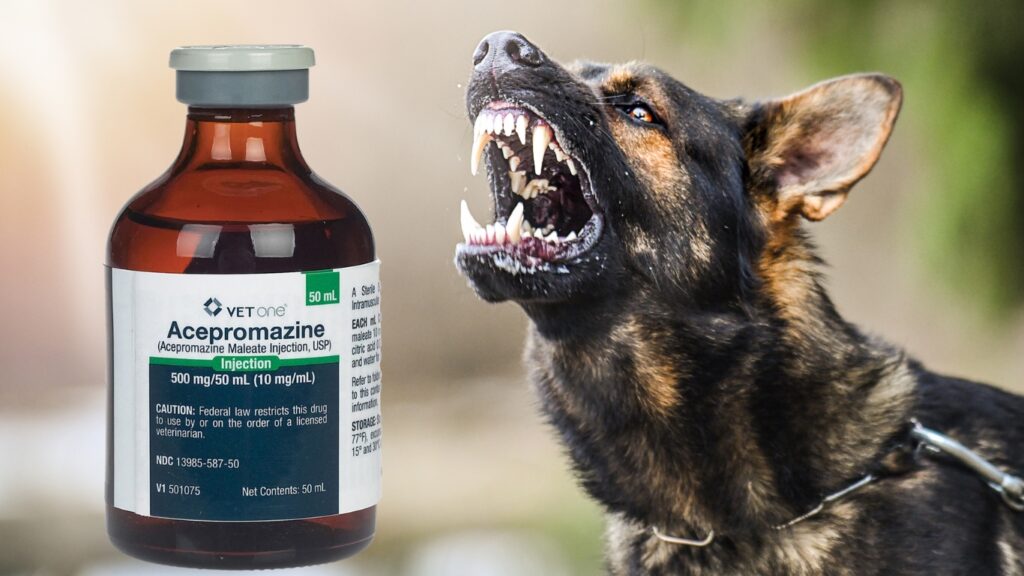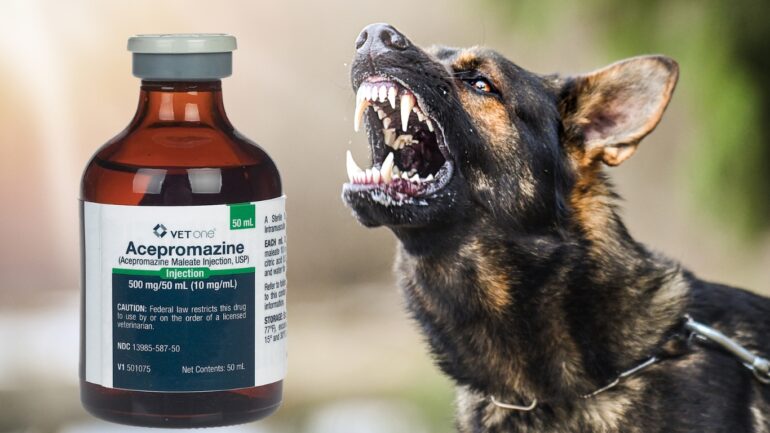Table Of Contents
Introduction
Understanding the ideal remedy dosage for dogs is of utmost significance for pet proprietors and veterinarians. Administering the incorrect dosage will have severe consequences, potentially leading to adverse outcomes or even fatalities. One such medication that calls for cautious attention is acepromazine. This introduction aims to shed light on “how much acepromazine will kill a dog” and briefly assess acepromazine and its everyday use.
Ensuring the proper dosage of medicinal drugs for dogs is essential for their properly-being and safety. Dogs, like humans, range in length, breed, and fitness conditions, and their bodies may also react otherwise to certain substances. Accurate dosing prevents overdosing, which could have excessive repercussions. Conversely, underdosing might also render the medicine useless or fail to provide the preferred therapeutic effect. Understanding the precise dosage is an obligation shared by pet owners, who may also administer medication at home, and veterinarians, who manually prescribe the treatment system.
Acepromazine for dogs is a widely used medicine in veterinary exercise. It belongs to a medication called phenothiazines and acts as a tranquilizer, sedative, and antiemetic. Commonly referred to as “Ace,” this medicine is often prescribed to relieve anxiety and worry in puppies during veterinary visits, grooming sessions, or tours. It is also usually applied as a pre-anesthetic agent to calm puppies before a surgical operation. Acepromazine works with the aid of affecting the principal frightened gadget, generating a sedative impact without inflicting vast analgesia (pain comfort).

While acepromazine for dogs can be helpful to use accurately, it’s essential to recognize that fallacious administration or exceeding the endorsed dosage can pose extreme risks to a dog’s health. This text aims to offer correct statistics and recommendations concerning acepromazine utilization, an excellent way to ensure the well-being and safety of canine companions.
Ultimately, expertise in the proper dosage of medicines for puppies is essential to avoid damage or damaging consequences. Acepromazine for dogs, a typically used medicinal drug in veterinary exercise, has its dangers and benefits. By exploring the proper use and dosage of acepromazine, puppy proprietors and veterinarians can make informed choices to safeguard the fitness and welfare of their bushy companions.
What Is Acepromazine?
Acepromazine for dogs is a typically used sedative and tranquilizer. It belongs to the class of phenothiazine tranquilizers. It is widely prescribed with the aid of veterinarians to help manipulate diverse situations, including tension, aggression, journey anxiety, and pre-surgical sedation. However, it’s essential to apprehend the appropriate dosage and potential risks related to its use.
Acepromazine acts as a primary nervous system depressant, primarily focused on the dopamine receptors inside the mind. It relaxes puppies by reducing anxiety, inhibiting certain behaviors, and inducing a mild sedative state. This medicine will be in tablet or injectable form and requires a prescription from a qualified veterinarian.
Acepromazine works by blocking the dopamine receptors, which decreases the transmission of nerve impulses inside the brain. As a result, the canine stories a sedative effect, characterized by rest, reduced muscle tone, and decreased responsiveness to stimuli. It no longer offers any ache comfort or anti-inflammatory houses.
Acepromazine is marketed under numerous logo names, such as Aceproject, PromAce, and Acevet. It is to be had in distinct formulations, which include oral capsules and injectable solutions. Depending on the dog’s length, condition, and precise veterinary instructions, the dosage and management route may also range. It is essential to discuss with a veterinarian the correct dosage and usage pointers for your dog.
It is critical to note that the misuse or overdose of acepromazine will kill a dog. While acepromazine for dog is typically secure while used effectively, administering an immoderate dose can lead to excessive sedation, decreased blood strain, cardiovascular results, respiratory despair, and even death. Therefore, it’s miles important to strictly comply with the prescribed dosage and visit a veterinarian for any concerns or questions regarding the administration of acepromazine.
In the end, acepromazine for dogs is a sedative and tranquilizer commonly used in veterinary medicine to manage tension and behavioral troubles. Understanding its mechanism of motion, appropriate dosing, and capacity dangers is crucial to ensure the nicely-being and safety of our dog partners. Always discuss proper steering with a veterinarian and avoid self-medication or administration without professional advice.
Recommended Dosage Of Acepromazine For Dogs
Acepromazine for dogs is a customarily used medication for sedating in various situations, consisting of during a tour or grooming. However, it is critical to manage the proper dosage to ensure your bushy associate’s good being and protection. Understanding the elements influencing the dosage and consulting a veterinarian for correct dosage dedication are vital steps in using acepromazine responsibly.
Factors Influencing The Dosage
The dosage of acepromazine for dogs depends on factors along with their weight, age, and typical fitness. More giant puppies can also require a higher dose than smaller ones, even as older or medically compromised puppies may need a modified dosage to keep away from ability headaches.
The supposed stage of sedation also plays a role in determining the proper acepromazine dosage. Mild sedation may be sufficient for grooming or minor procedures, while more profound sedation is required for the tour or good-sized medical approaches.
Dosage Guidelines For Different Functions
Dosage hints for acepromazine range primarily based on the meant motive. An ordinary starting dose for moderate sedation is 0.25 to 0.5 mg in line with a pound of frame weight, administered orally. However, for a tour or extra profound sedation, the dosage can vary from 1 to 2 mg, consistent with a pound of frame weight.
Administering Acepromazine Orally Or Through Injection
Acepromazine can be administered orally or through injection. Oral management is generally desired for convenience, while injections may be used for quicker and more instantaneous effects. The dosage and method of administration should be decided by using a veterinarian based on the canine’s character wishes.
Importance Of Consulting A Veterinarian
Consulting a veterinarian is essential while determining the ideal acepromazine dosage for your canine. Veterinarians have the know-how to assess your canine’s health circumstance, recall any underlying factors, and provide correct dosage tips tailored to your pet’s unique requirements. They will remember the dog’s clinical history, ability to drug interactions, and any contraindications that could affect the safe management of acepromazine.
In conclusion, administering acepromazine to puppies calls for cautious attention to different factors, including weight, age, health situation, and the favored level of sedation. It is vital to seek advice from a veterinarian to determine the proper dosage, whether or not administered orally or via injection. By following good dosage hints and looking for expert recommendations, you can ensure acepromazine’s safe and powerful use on your canine’s sedation wishes.

Understanding The Risks And Side Effects
Acepromazine for dogs is a customarily used sedative and tranquilizer in veterinary medication. While it can be powerful in calming dogs throughout certain situations, pet owners and veterinarians need to be privy to the capability risks and aspect outcomes associated with its use. This article offers comprehensive information on the topic, emphasizing the importance of responsible and individualized remedy plans.
Common Aspect Outcomes Of Acepromazine In Dogs
When administering acepromazine for dogs, it’s crucial to be privy to the capacity facet results in it can have on dogs. These can include sedation, reduced blood strain, slowed heart rate, and moderate gastrointestinal disenchants. Dogs might also enjoy a drop in frame temperature, decreased coordination, and expanded sensitivity to noise or contact. It is critical to display the canine closely at some point during the administration of acepromazine for dogs to ensure the animal’s nicely-being.
Potential Risks Related To Incorrect Dosage
Administering the wrong dosage of acepromazine will kill a dog. An overdose may additionally reason severe sedation, excessive drop in blood pressure, respiratory melancholy, and even coma. Additionally, certain breeds, including Boxers and Greyhounds, are more touchy to acepromazine and might require decreased doses to avoid detrimental effects. It is vital to visit a veterinarian to determine the proper dosage primarily based on the dog’s individual traits and scientific records.
Contradictions And Precautions To Take Into Account
Acepromazine for dogs may not be appropriate, in particular, those with pre-existing medical conditions together with a heart disorder, liver disorder, or specific neurological issues. It must also be used cautiously in geriatric puppies. Drug interactions with other medicinal drugs should be considered to save you from damaging reactions. Veterinarians must be consulted to assess the canine’s health status and decide if acepromazine for dog is a safe alternative.
Discussing The Significance Of Individualized Remedy Plans
Every dog is unique, and their response to medicinal drugs can vary. It is vital to emphasize the importance of individualized treatment plans when using acepromazine or every other medication. A veterinarian must examine the dog’s average health, recall any pre-existing conditions, and determine the correct dosage and administration technique. Regular tracking and open conversation between puppy owners and veterinarians can help ensure the dog’s proper being through treatment.
In conclusion, understanding how much acepromazine will kill a dog and which side effects are critical for canine proprietors and veterinarians alike. Being aware of the not unusual aspect outcomes, capability dangers associated with incorrect dosage, contradictions, and precautions can assist in making sure the safe and effective use of this medicinal drug. Developing individualized remedy plans tailored to each canine’s wishes is essential to promote their universal well-being and limit potential complications. We will ensure the best possible care for our bushy companions by prioritizing accountable medication management.
Overdose And Toxicity Concerns
Acepromazine for dogs, a commonly prescribed medicine, is typically used as a tranquilizer and anti-anxiety agent. However, it’s far crucial for dog proprietors to be privy to the ability risks associated with an acepromazine overdose. This article aims to offer valuable statistics concerning the symptoms of acepromazine overdose in dogs, on-the-spot actions to take if an overdose is suspected, the importance of contacting a veterinarian or poison management middle, and the capacity lengthy-time period consequences of overdose and toxicity.

Identifying Symptoms Of Acepromazine Overdose In Puppies
- Excessive sedation: Dogs may also show extreme drowsiness, weak spot, or difficulty standing or strolling.
- Irregular heartbeat: Rapid or irregular heart fee may significantly indicate an overdose.
- Hypotension: Low blood strain may also appear as weakness, pale gums, or disintegration.
- Respiratory misery: Shallow respiratory, panting, or problem breathing are signs of an issue.
- Seizures: In extreme cases, puppies may additionally revel in seizures or convulsions.
Immediate Moves To Soak Up Cases Of Auspected Overdose
- Remove the canine from potential risks and preserve them in relaxed, quiet surroundings.
- Contact a veterinarian immediately or, if to be had, a nearby poison manipulate middle.
- Be organized to offer facts about the dog’s weight, the quantity of acepromazine ingested (if known), and the time of ingestion.
Importance Of Contacting A Veterinarian Or Poison Control Center
- Veterinary experts can verify the severity of the situation and offer precise steering.
- They may also recommend inducing vomiting if the ingestion occurred lately or recommend other appropriate remedies.
- Prompt medical intervention can probably shop a dog’s existence and prevent long-term complications.
Potential Lengthy-Time Period Outcomes Of Overdose And Toxicity
- Organ damage: An acepromazine overdose can adversely affect the liver, kidneys, and cardiovascular machine.
- Neurological issues: Prolonged overdose or toxicity might also result in neurological problems or get worse present ones.
- Behavioral changes: Dogs that have experienced an overdose may additionally showcase lengthy-term tension, aggression, or melancholy.

In conclusion, information on the symptoms of acepromazine overdose, taking rapid movement, and searching for professional assistance is vital in ensuring a dog’s well-being. Timely intervention can limit the capacity for long-term consequences and provide the first-rate risk for a successful recuperation. Remember, constantly consult with a veterinarian earlier than administering any medicinal drug to your pet, and preserve all medicines adequately saved to save you from unintended ingestion.
Conclusion
In conclusion, this article has provided a complete overview of “How Much Acepromazine Will Kill a Dog” and highlighted numerous vital factors worth considering.
Firstly, it’s crucial to understand that acepromazine, like any other medicine, can harm puppies if not used properly. The dosage and management of acepromazine for dogs should constantly be decided by a qualified veterinarian, deliberating the individual dog’s health situation, length, and specific needs. Avoiding self-medicinal drugs or counting on anecdotal records when administering medicinal drugs to our loved pets is vital.
Secondly, accountable medication use for puppies is of utmost significance. As puppy proprietors, we are responsible for prioritizing the nicely-being and protection of our hairy companions. This method searches for professional recommendations and steerage from a veterinarian earlier than administering any medicine. Veterinary professionals possess the critical know-how and knowledge to prescribe the suitable dosage and monitor capacity facet outcomes or interactions with different medicinal drugs.
Lastly, this text strongly encourages readers to discuss with a veterinarian for particular recommendations regarding acepromazine for dogs or every other remedy. Veterinarians are trained experts who can assess a canine’s fitness, recall any pre-existing conditions or medications, and offer tailor-made pointers. They can also deal with any concerns or questions that can stand up.
In the end, the welfare of our puppies has to be our utmost precedence. Responsible medication use entails in search for professional steering, fending off self-medication, and relying on correct statistics. By consulting with a veterinarian, we can ensure the protection and properly-being of our dog companions. Remember, the fitness of our pets is in our arms, and with responsible medication practices, we can provide them with the care they deserve.
Frequently Asked Questions (FAQs)
Can acepromazine be deadly for puppies?
Acepromazine for dog can be fatal if administered in excessive doses. It is a potent tranquilizer, and overdosing can cause extreme fitness headaches, which include respiratory distress, cardiovascular crumble, and even death.
How speed does acepromazine take to impact?
Acepromazine commonly takes impact within 30 to 60 mins after management. The onset and length of action may additionally range depending on the person’s canine metabolism and other factors.
Can acepromazine be used for competitive dogs?
Acepromazine for dogs isn’t encouraged as a sole treatment for aggression. While it could have a sedative impact, it does now not address the underlying causes of the attack. Consult with a veterinarian to discover appropriate behavior change strategies or other medications that may be more appropriate.
Are there alternative sedatives to acepromazine?
Yes, alternative sedatives to acepromazine for dogs may be considered. Your veterinarian can prescribe other medicinal drugs, which include benzodiazepines or alpha-2 agonists, which can be more suitable to your canine’s unique needs.
What must I do if I accidentally provide too much acepromazine to my dog?
If you accidentally administer an immoderate dose of acepromazine to your canine, it’s crucial to look for immediate veterinary attention. Contact your veterinarian or an emergency veterinary health facility to tell them approximately the state of affairs and observe their commands for similar care.
Is acepromazine secure for pregnant or nursing dogs?
Acepromazine isn’t endorsed for use in pregnant or nursing dogs. The safety of acepromazine for dogs during these stages has no longer been thoroughly studied, and it is excellent to keep away from its use to prevent any capability dangers to the mom and her dogs.

